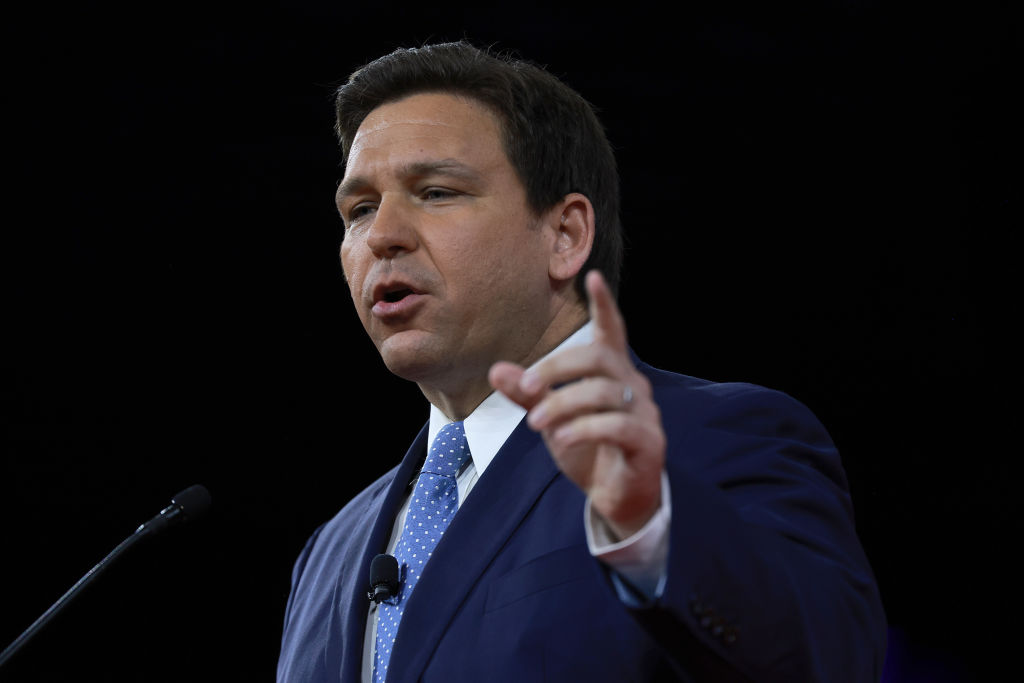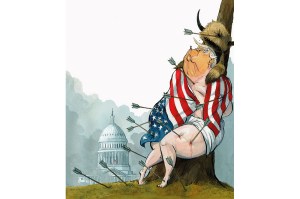The Walt Disney Company is going to need some special magic following two losses in the Florida state legislature. Florida’s House and Senate passed laws this week ending Disney’s self-governing special district and closing an exemption in the current social media law for companies that own theme parks. Governor Ron DeSantis is expected to sign the legislation.
It’s a quick governmental haymaker to Disney’s big-eared visage and a surprising one. The Friends of Ron DeSantis political action committee has accepted almost $107,000 from Disney Worldwide Services, according to records. Disney regularly hands out money to both Republicans and Democrats. That ended in March, when the company decided to halt all Florida political donations over the Parental Rights in Education Act aka the “Don’t Say Gay” bill.
Florida Republicans might feel positively about the revenge victories they’re set to score against Disney. The social media law, however, is currently tied up in courts, while it’s likely that getting rid of the theme park exemption will hurt Florida’s case more than helping it.
“It’s pretty much brazen evidence that, ‘Hey, you know what, we’re going to use this law to target anyone who says things that we don’t like,’” said TechFreedom’s Ari Cohn. “It’s impossible to tune out the context of how this happened.”
A judge named Robert Hinkle cited the First Amendment when he issued a temporary injunction against the social media law last summer. “The legislation now at issue was an effort to rein in social media providers deemed too large and too liberal,” he wrote, comparing it to torching a house to roast a pig. “Balancing the exchange of ideas among private speakers is not a legitimate governmental interest.”
Ending Disney’s status as a special district is a more complicated matter. Disney’s Reedy Creek Improvement District enjoys plenty of autonomy over taxation, utilities, and the issuance of bonds. This responsibility would now fall onto the counties of Orange and Osceola, which surround Disney World.
“That would be something for the period between the law passing and when it takes effect,” said Sal Nuzzo, vice president of policy at the Florida-based James Madison Institute, in an email. “There are a variety of specifics that would need to be worked through in order to manage the transition effectively.”
Nuzzo supports Florida’s review and revocation of Disney’s Reedy Creek, saying that as a federalist, “I believe that in our system of government the state should be supreme – the states created the federal government and the states created the local governments.” He notes there’s plenty of time to work through issues over which county gets what. “The state would provide more than a year to work through the specifics and ensure that all of the complexities are managed effectively.”
Skepticism remains, though, especially over the timeline. “As with dividing property in a divorce or estate, dividing distinctive assets among successor jurisdictions can involve messy and contentious disputes with no single obvious or right solution,” said Walter Olson at the Cato Institute. “Again, this suggests that dissolution is best attempted in a deliberate rather than hurried way and with buy-in from the participants, particularly local governments and most particularly if those local governments are being asked to assume new debt they never planned on taking on.”
There’s also disagreement between Nuzzo and Olson as to how advocates of smaller government should feel about Florida’s moves against Disney. Olson thinks market-oriented analysts would support special districts on a broad basis because they can “better match the group paying for a given service with the group benefiting from it, and assign management power to those directly on the scene rather than distant groups….”
Nuzzo, the federalist, supports Florida on principle, saying state governments are “the most effective bodies to determine how local governments are structured and organized.” He adds, “The idea that Florida has allowed more than 1,800 special districts to come into existence and remain is a testament to the fact that this review is absolutely needed.”
The federalism arguments make sense to a certain extent because state governments, in theory anyway, know what their citizens want better than the feds. Yet there are still worries that the Florida initiative is giving too much power to government. The concern is that every time a culture war breaks out, governments and politicians will swoop down with retaliatory policies.
“It all comes down to two wrongs don’t make a right,” Cohn observed. He compared Florida’s Disney actions to a 2019 decision by the San Antonio City Council to reject an airport contract to Chick-fil-A over the fast food chain’s alleged anti-LGBTQ+ beliefs: “People of principle will decry both equally. Do we want to make this a race to the bottom or do we want to fight fire, not with fire, but with principle. I’d prefer the latter.”
DeSantis seems to be taking a page out of Texas governor Greg Abbott’s playbook. Abbott recently ordered state troopers to inspect every eighteen-wheeler at border crossings with Mexico. This forced the Mexican governors of Chihuahua, Coahuila, Nuevo Leon, and Tamaulipas to add more border security. He then ended the mandatory inspections and declared victory.
It’s possible DeSantis will get assurances from Disney that they’ll restart Florida political donations to both parties. They may also promise to stay out of future culture war legislative fights and scale back their woke agenda. This could then cause DeSantis to veto the special district bill or push for a new bill reauthorizing Reedy Creek next legislative session.
All this could change, of course, should DeSantis not win reelection this fall. Democrat Nikki Fried sees herself as a princess running to the aid of the hallowed Mouse; she calls DeSantis “perfect Disney villain.” He’s no Gaston, or even Jafar, but Fried is also no Belle or Jasmine. She still needs to get past former Republican governor, failed Independent, and now sort of successful Democratic congressman Charlie Crist in the primary.
Which raises the question: is Crist Scar or Prince John?


















